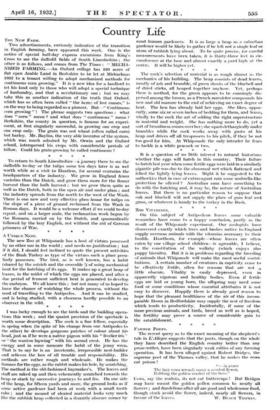Country Life
TOR NEW FARM.
TWO advertisements, curiously indicative of the transition in English farming, have appeared this week. One is the notice of special half-day express excursions from King's Cross to see the daffodil fields of South Lincolnshire; the other is as follows, and comes from The Times : MECIIA- NIMD FARMING.—An Oxford college has 330 acres of flat open Arable Land in Berkshire to be let at Michaelmas 1932 to a tenant willing to adopt mechanized methods for continuous corn growing." It is a new idea for a landlord to let his land only to those who will adopt a special technique of husbandry, and that a revolutionary one ; hut we may take this as another indication of the truth that Oxford. which has so often been called "the home of lost causes," is on the way to being regarded as a pioneer. But—" Continuous corn growing" I The phrase suggests two questions : what does " corn " mean ? and what does " continuous " mean ? Berkshire, the county in question, is famous for an experi- ment, at first singularly successful, in growing one crop and one crop. only. The grain was not wheat (often called corn) but barley. Mr. Bayliss, the very able inventor of the system, which was much admired by Mr. Orwin and the Oxford school, interspersed his crops with considerable periods of fallow. Could his grain-growing be called continuous ?
* * * *








































 Previous page
Previous page